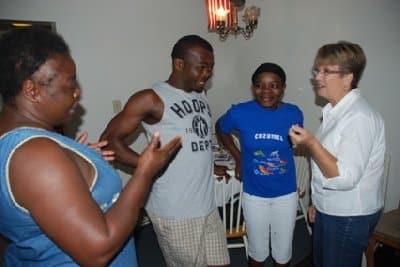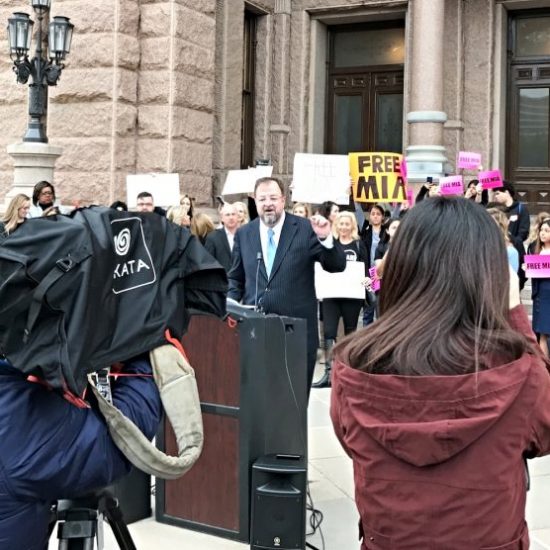GREENSBORO, N.C. (ABP) — With five children to feed after her husband died “Rebecca” faced dreary prospects in Cameroon.

“Rebecca" agreed to come to America as a nanny to provide money for her five children in Cameroon, where there are no jobs. Sandra Johnson, right, helps the family in Greensboro after children Marcellinus and Beltha came with their brother Leonel in August. (ABP photo by Norman Jameson)
|
There are no jobs in that African nation located just above the equator on the western coast. Still, she was leery and took months to consider a man’s offer for work in America watching two young children for a family originally from Cameroon.
She would be paid room and board and $225 a month, which she could send home to give her five children, the oldest of which was then 18, a lifeline of support. Little did she know she would quickly need her own lifeline.
Rebecca (not her real name) was hustled from the Greensboro, N.C., airport to her employer’s house and did not leave the house for five dreary months. Her room contained a bed and nothing more – no chair, telephone, radio or television. Two uniforms hung in an otherwise empty closet and she was told not even to unpack her suitcase.
Her “board” consisted of two meals a day, the first at 4 p.m. and the second at 10 p.m. after the employer’s family had retired for the evening. She was to eat nothing but what they gave her at those times and was not to be downstairs when they were.
Rebecca, 50, did not know how to operate a washing machine and was taught nothing about kitchen and household machinery. When she tried to get the sheets from her bed washed, they were conveniently neglected — for all of the five months she lived there.
“A lot of women are brought here just like that, to be nannies,” said Sandra Johnson, director of Triad Ladder of Hope, a Christian Women’s Job Corps site that is well known in central North Carolina by law enforcement officers as an organization that helps women who have been trafficked. “When they get here they find circumstances are not what they were told.”
Human trafficking is a problem bigger than most people can begin to fathom, said Johnson, who has helped American citizens break free from being trafficked inside the country.
Rebecca was referred to her and Johnson has helped her find work and housing and helped get three of her children from Cameroon to Greensboro in August. Two other children and two grandchildren remain in Cameroon, awaiting visas.
Johnson calls Rebecca’s forced labor and captive living conditions “modern slavery.” People see others living in those conditions every day and likely do not recognize it: at restaurants, migrant fields, food processing plants and as domestics and in sex trade.
Rebecca’s charges were an infant and a 10-year-old severely disabled girl, whom she had to carry to and from the special bus that picked her up. That journey from the house to the bus was as far as Rebecca ever ventured.
Carrying, showering and massaging the 10-year-old eventually caused severe pain in Rebecca but when she complained about it to her employer, he said she had the “African disease” — laziness.
Finally the pain grew so constant and intense Rebecca called an ambulance, providing her first foray outside her host home since she arrived on Oct. 19, 2006.
“My body was hurting me, my shoulders were in pain, but they were not taking it serious,” Rebecca said. “God showed me the way and I make it because the day I was leaving the house it was like a shock to him.”
She said her employer “nearly collapsed” when she told him she had called an ambulance.
“That house, it was like living in hell,” said Rebecca.
After her hospital stay her employer did not come for Rebecca. That greatly surprised her, even though she didn’t want to go back to the house. When she asked for help to retrieve her belongings from the house so she could return to Cameroon, a nurse called the police.
The policeman who took her to the house cried when he saw her room. Police called social services, from where Rebecca was connected to the African Services Coalition and Lutheran Family Services, and asked her to stay in the U.S. and testify against the family.
Although she was free of her abuser, Rebecca could do nothing for her children, who were calling her because they had no money and needed help.
At the same time, relatives in Cameroon discouraged her from doing anything that would put the abuser — himself from Cameroon — in jail. Rebecca does not want her real identity used in this story for fear of retribution to family in Cameroon.
Because Rebecca is a victim of human trafficking some services were available to help her. She currently works at an assisted living home. Her adult children who came in August await their special designation visas before they can work or go to school.
Rebecca’s mother was keeping an eye on the children in Cameroon but she died in 2009. Her middle brother picked up the responsibility, but it wasn’t the same.
Rebecca is philosophical. “You cannot tell the future,” she said, although she hopes her future includes U.S. citizenship.
She holds no grudge against the family that misrepresented themselves and brought her to the States. She said, “Maybe that’s the way God wanted me to come to America. I want them to live happily because I’m living happily too.”
When she first came to America, she felt she was living in hell. Now, she said, with three children around her in a cramped apartment, with a job and with a friend like Johnson to help her navigate, she said, her life is “like living in heaven.”
-30-
Norman Jameson is assistant dean for development for the Wake Forest University School of Divinity.

